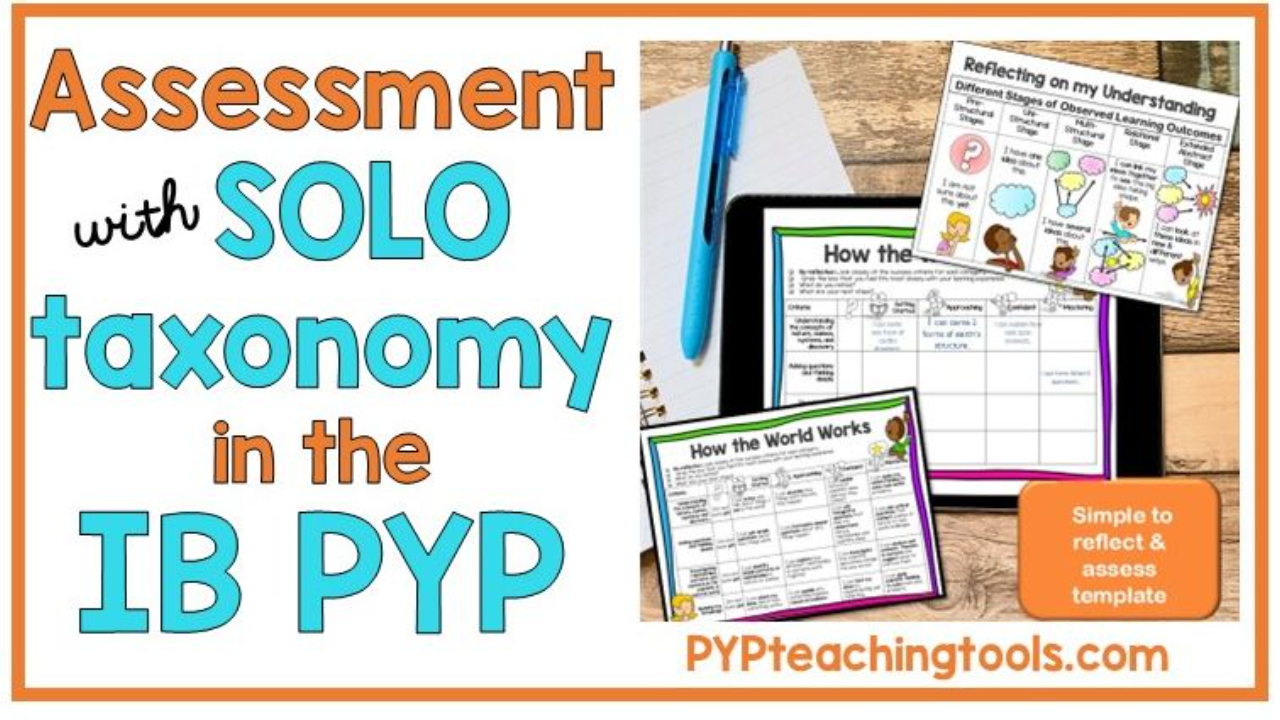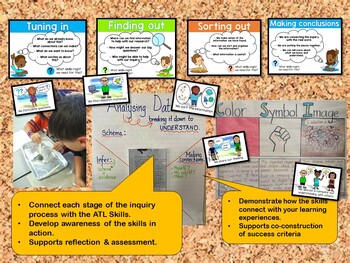Welcome to PYPteachingtools.com
Assessment & Reflection: Using SOLO Taxonomy in the IB PYP

Developing Reflective Thinkers: Using SOLO Taxonomy in the IB PYP
Why SOLO matters in a concept-based classroom
In an inquiry-driven IB PYP classroom, assessment is not just about what students know. It is about how they think, how they connect concepts, and how they grow as reflective learners. SOLO Taxonomy (Structure of Observed Learning Outcomes), created by John Biggs and Kevin Collis, provides a simple yet powerful framework to track and support this growth. Let me share how I use it in my classroom to develop and support our culture of on-going reflection.
SOLO describes levels of understanding:
-
Prestructural – The student is missing the point
-
Unistructural – One relevant idea is identified
-
Multi-structural – Several relevant ideas are collected but remain unconnected
-
Relational – Ideas are linked into a meaningful whole
-
Extended Abstract – The learner transfers and applies understanding in new ways
In many ways, SOLO mirrors the learner’s journ...
Making Sense of IB PYP Learning Progressions: A Teacher's Guide to Supporting Student Growth

Making Sense of IB PYP Learning Progressions: A Teacher's Guide to Supporting Student Growth
Let’s be honest: when you first come across the term learning progressions in the IB PYP, it can feel a bit abstract. I know it did for me and, quite honestly, my first question was, "Well, aren't we already monitoring learning progression? What's the point of this new thing?". If you're anything like most of the amazing PYP teachers I work with, you're already balancing a lot—unit planning, inquiry scaffolding, ATL integration, and of course, the day-to-day magic of keeping your classroom buzzing with curiosity. Let me give you a simplified opinion, share how it can look in the classroom and hopefully clarify things. Read on. 😊
I work with, you're already balancing a lot—unit planning, inquiry scaffolding, ATL integration, and of course, the day-to-day magic of keeping your classroom buzzing with curiosity. Let me give you a simplified opinion, share how it can look in the classroom and hopefully clarify things. Read on. 😊
So where do learning progressions fit in? Are they another “thing” to do? And is this something "new" to have to learn?
Here’s the good news: they’re not a burden. They are NOT mandated.
They are a tool to support you and your students.
In fact, once you underst...
Differentiation in the IB PYP Classroom
Helping Every Inquirer Grow
If you've been teaching within the IB PYP framework for a while, you’ll know that differentiation is more than a concept—it’s a mindset. It's an approach to teaching. It’s about meeting every learner where they are, guiding them forward with intention, and designing experiences that are as inclusive as they are rigorous.
In an inquiry-based classroom, differentiation doesn’t mean multiple lesson plans for 25 learners (phew!)—it means providing the right level of support and challenge so that each student can think deeply, inquire independently, and feel successful.
Let’s break it down into three essential aspects: form, function, and assessment. The video is a snippet from Essentials for Inquiry members' community. Each month, I share professional learning along with classroom ready tools to support your application of this learning within your planning and teaching. Find out more about the membership here. 😎
1. Form of Differentiation: What Does It Lo...
10 Easy Assessment Strategies for Conceptual Understanding in the IB PYP

10 Easy Strategies for Assessing Conceptual Understanding in the IB PYP.
Helping students build conceptual understanding is at the core of how we approach knowledge in the IB PYP. But how do we ensure they’re truly grasping big ideas rather than just recalling facts? I've put together 10 simple, effective ways to check for conceptual understanding at different grade levels ( supporting differentiation and diverse learning styles)—whilst encouraging student agency. Plus, you’ll find links to several resources that I designed for my class to support their self-assessment and reflective thinking practice.
Look for the IB PYP This or That Exit Slips and Reflection Task Cards for Concepts to support deeper thinking across all transdisciplinary  themes. They were such a hit for students and teachers!
themes. They were such a hit for students and teachers!
For Your Lower Grades Learners
-
Concept Sorting with Real Objects
This is an example of internalisation & classification in action.
Provide a variety of real-world objects and have s...
Strategies to Support Reflection & Assessment in the IB PYP
You know that way when your students' reflections are just regurgitated and not really giving us insight as to their conceptual understanding? When it comes to reflection and assessment in the IB PYP, fostering student voice and agency is at the forefront of creating engaged and lifelong learners. At the heart of this endeavour we want our students to truly understand what it means to BE reflective. Not only an attribute of the Learner Profile but being reflective is also a key Thinking Skill. The importance of this skill comes into play when we are assessing the concepts around which we plan and implement our inquiries. Concepts serve as the backbone of the IB PYP curriculum. Concepts not only deepen understanding but also empower students to take ownership of their learning experiences.
Easy Strategies to Develop Reflective Thinkers

I'm excited to introduce a powerful approach to enhance reflection and inclusive assessment in the IB PYP through the lens of conceptual awareness. ...
Planning Through the IB PYP Approaches to Learning Skills


The IB PYP Approaches to Learning Skills are a BIG deal! We think of them as the tools that support independent learning, amplifying the journey as the children progress with their development of those 21st century skills. And it is so important to identify those skills and then acknowledge them. Transparency is key.The functional language or action words help us when planning through the ATL skills with the children, to assist with recognising the skills in use, being able to transfer those skills authentically and connect the purpose to their learning meaningfully. Read on for practical ideas and tools for assisting with co-planning through the IB PYP Approaches to Learning Skills and watch the video where I share practical strategies for including the children in the planning process.As you know, the PYP aims to develop inquiring, knowledgeable, and caring young people who help to create a better and more peaceful world through intercultural understanding and respect. | ...
Implementing Visible Thinking Routines in the IB PYP

When it comes to reflection and assessment of our IB PYP transdisciplinary inquiries, we are fundamentally assessing the abstract; understanding of concepts, transfer of knowledge and development of skills. These are not things that can be monitored with multiple choice assessments. (If you'd like to explore more about assessment in the PYP, start with this article here. ) Part of our assessment strategies include on-going documentation of the learning process, which includes the children's thinking and this is where the valuable visible thinking routines assist. I am delighted to welcome my guest writer, Jahnavi Aswani, a homeroom teacher-facilitator with PYP 3 from Mount Litera School International, Mumbai. She is bringing her experience with visible thinking routines and practical ideas to share with our community. As you read through Jahnavi's article, consider the Approaches to Learning Skills that are put into practice within the different thinking routines. Read on for some gr...
Surviving Report Cards in the IB PYP School

Love them or hate them, report cards are a much-needed communication for all involved. The IB PYP report card gives you a road map of the standards your student is working on together with those abstract elements that are essential parts of the whole child. If you're new to the PYP report card, it can look a little overwhelming, bordering on an essay in some schools! (I am not kidding!) However the format, the report card provides an opportunity to look closely at each child’s journey of their learning and, most importantly, from a whole child perspective. If you're looking for some guidance and a free set of report card comments, read on.
The Whole Child Approach
Every child meets or exceeds expectations on a different day at a different time, or quite possibly a different year. The expectation we have to emphasise with learning standards is that it's a journey, not a race.
The expectation we have to emphasise with learning standards is that it’s a journey, not a race.
Asse...
Bringing Student Agency into Assessment in the IB PYP

Student Agency and Inclusive Assessment
Over the years, Ive chatted about inclusive assessment as a practice that needs to become embedded within any student-led, inquiry-based classroom. This message has been spread far and wide that this is a really important part of our daily routine. The IB themselves shifted towards on-going reflection, we have student agency as all the buzz ( and hallelujah for that!), numerous educators within our community are sharing their rationale for the value that inclusive assessment brings and none of this could have come a moment too soon. Yes, its that vital.
If we consider assessment as a key element within education, then we have to reconsider the role our students play within that element.
If you'd like to catch up with my 3 part series of articles, you can link to those here. They cover the form and function of assessment in the inquiry-based classroom, together with strategies for developing inclusive assessment in your classroom. 
Br...
Reflection in the IB PYP- A Journal for Self Discovery


A brand new year is upon us once more! And a new year is always a good time for self reflection. (I have spoken a lot about reflection within the IB PYP and offered multiple strategies that can be used in previous posts. You can read more about that further on.) But with this post, I’m focusing largely on self-reflection; developing reflective thinking skills within the children and ultimately bringing each child a greater awareness of their own Learner Profile and personal, social and emotional development.
With reflection having been removed from the IB key concepts and student agency being a key focus lately, I felt that there was a need for us to maintain this big idea of reflection throughout our learning environment and certainly within the process of inquiry based learning itself. I wanted my students to be able to understand the importance of reflective thinking and it’s role in self-assessment and the inquiry process, not to mention personal, social and emotional education...

